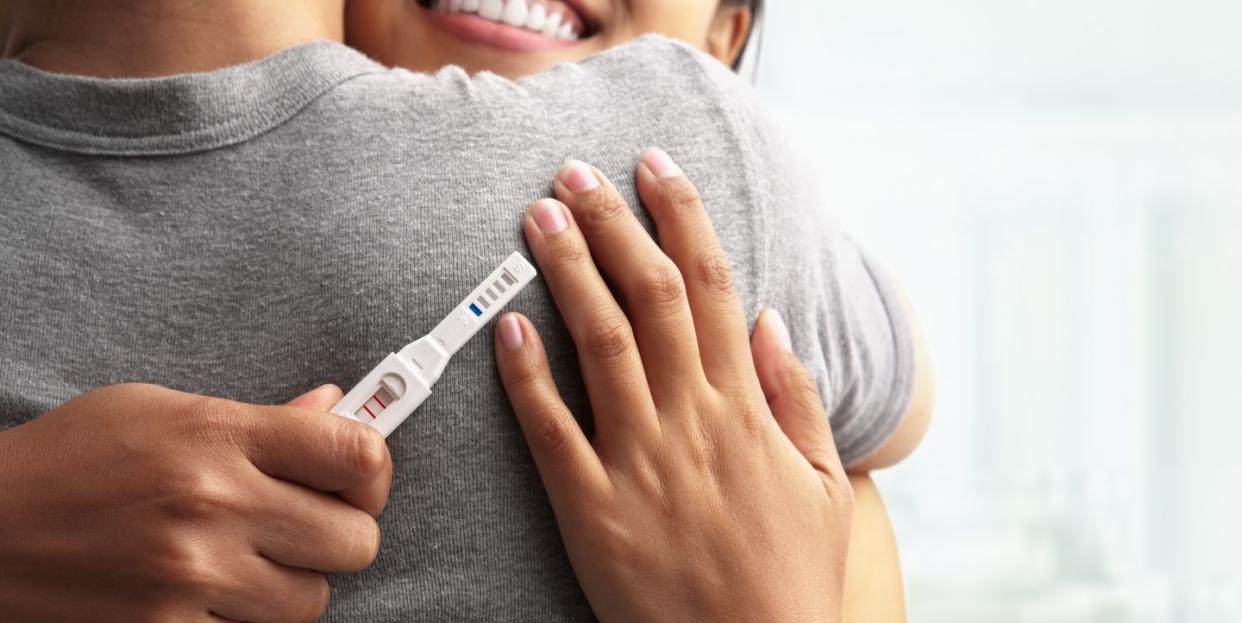When Are You Most Fertile?

While women are having more children today than they were 10 years ago, according to the Pew Research Center, they're also having babies when they're older — a recent report found that 86% of U.S. females have given birth between the ages of 40 and 44, a 6% increase from 2006.
That may be why fertility is also a common issue, as the Office on Women's Health says one of the top risk factors concerning an inability to conceive is age. So it begs the question: When is a woman the most fertile?
The Facts About Fertility
Your odds of getting pregnant are highest in your 20s and 30s, as this is when women are technically the most fertile and have some of the best quality eggs, says Beth W. Rackow, M.D., associate professor of obstetrics and gynecology and pediatrics at Columbia University Medical Center. It's also when you're least likely to have to wait: According to the American College of Obstetricians and Gynecologists (ACOG), healthy couples in their 20s and 30s have a 25-30% chance of getting pregnant in a single menstrual cycle.
But around age 35, those numbers slowly and steadily dwindle, Dr. Rackow says. The risk of miscarriage also increases due to poorer egg quality. After age 37, a woman's odds of becoming pregnant decreases rapidly, ACOG says, and by the time a woman celebrates her 40th birthday, there's a less than 10% chance of getting pregnant within each menstrual cycle.
Which is why, if a woman is under the age of 35 and has been trying to get pregnant for one year, it's recommended that she receive an infertility evaluation, Dr. Rackow says. If she's between the ages of 35 and 40, only wait six months before seeing a specialist. In your 40s, it's important to seek medical attention if there are no signs of conception after only two or three cycles.
"We don't want to scare women that by age 35 they aren't going to get pregnant — that's not the case," Dr. Rackow says. "[But] it gets more difficult as a woman gets older, so we don't want them, at age 35, to be trying for two years and then see us when we could have done something sooner."
Your Fertility During Each Cycle
Making a baby the old-fashioned way comes down to figuring out when your body is ovulating. The ovulation phase, or the time in a woman's menstrual cycle in which an ovary releases an egg in order to be fertilized, lasts up to two days. There's the day of ovulation itself (AKA when the egg is released), along with the 24 hours leading up to it. That's when you're most fertile, Dr. Rackow says.
Couple that with sperm's ability to live inside the female reproductive tract for 48 to 72 hours, and your highest likelihood of success is, you guessed it, during the ovulation phase. "We encourage couples to be intimate every other day leading up to the timing of ovulation, and then every day [during the ovulation phase]," Dr. Rackow says.
As for how to pinpoint this momentous monthly occurrence, begin by tracking the length of your menstrual cycle, as some women's cycles can be 26 days and others' 32 (though the average is 28), Dr. Rackow says. Then, pay attention to when you get your period. "About 12 to 14 days before your next period is usually when you would ovulate," she says.
Your body also gives signs that you're ovulating. Clear vaginal discharge (or cervical mucus), breast tenderness, and pelvic cramping are common symptoms, Dr. Rackow says, and many women also experience a slight increase in body temperature during the ovulation phase, according to the American Pregnancy Association.
How to Tell When You're Ovulating
Other than reading the all-natural signs from your body, there are ways to tell if you're ovulating. Dr. Rackow recommends a urine ovulation kit, which measures when the body has a surge of luteinizing horrmone that signals ovulation. And while there are digital tests available, she notes that the daily test strips work just as well.
Otherwise, a fertility app could be useful in helping you keep track of your cycle. That way you always have it on you, you can log symptoms on the fly, and you can even set up alerts to remind you when you're in the ovulation phase. (And tell your partner it's time to get busy.) Nathaniel DeNicola, M.D., assistant professor of obstetrics and gynecology at the GW School of Medicine and Health Sciences, says the ones he sees being used most frequently are Glow, Clue, and Ovia Health (formerly known as Ovuline).
Just don't rely on the apps to be the end-all, be-all source of knowledge for getting pregnant. Yes, health apps are on the rise — a recent study found that more than 70% of U.S. adults use an app to self-monitor their well-being — but Dr. DeNicola says the limited research that has been conducted to determine the accuracy of predicting the fertility window “has been a little underwhelming.”
And, whatever you do, don't forget to tell your doctor about any tests and trackers you're using when trying to conceive, Dr. DeNicola says. "A lot of what we do in fertility and achieving conception counseling is looking at the timing of periods," so your doctor will be able to use that information to get a more in-depth look at your health, potentially making it easier to spot health concerns, notice if something is irregular, or make more personalized suggestions that could result in fertility success.
You Might Also Like


